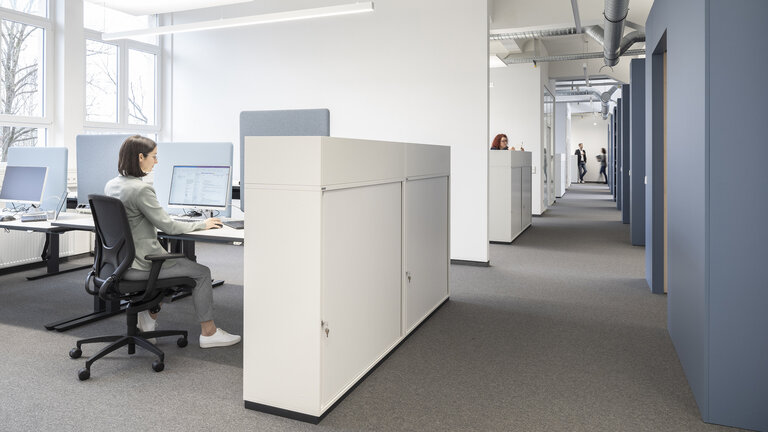Kirchheim unter Teck, Germany, November 5, 2020. Working from home, virtual videoconferencing as well as innovative designs for citizen interaction and offices should be the rule in public administration, too, rather than the exception. The city administration of Kirchheim unter Teck demonstrates how this can work very well, especially under Covid-19 conditions. The current need to renovate its administrative buildings prompted it to try out a design for new working environments. A large-scale pilot project was implemented for this purpose: 45 workplaces were relocated to a former factory building on the Otto Ficker site. The work environment experts of RBSGROUP, a subsidiary of the Stuttgart-based planning and consulting company Drees & Sommer SE, assisted the city in designing and implementing the new setting for work and offices.
Back in May 2018, Kirchheim unter Teck had leased around 1,000 square meters of space on the Otto Ficker site. The city is located 25 km southeast of Stuttgart. Since then, almost 50 employees from the human resources, organizational and finance departments have relocated. Mayor Stefan Wörner expects the new premises to improve cooperation between each of the departments: ‘We now have 45 staff members on one floor. They were previously spread over seven floors in different buildings. We have also upgraded our technology to enable us to hold professional-style video conferences, for example. As we were one of the few public sector employers to offer the option of working from home even before the pandemic, very good IT infrastructure is essential for us,’ the Mayor continued. He added that this is proving to be an enormous advantage, especially now that stricter corona rules are in force once again.
Accessible to citizens despite the pandemic
It is only possible to implement corona protective measures in the other administrative buildings with major restrictions, due to the physical layout of the space. The new pilot space, on the other hand, can be easily adapted. It was divided into three different zones, with public, semi-public and shielded areas. In the publicly accessible zone, panels made of acrylic glass protect citizens and employees from Covid-19 infection spread by droplets. In addition, an online appointment scheduling tool ensures short waiting times and helps administrative staff to control the flow of visitors. This is proving to be particularly valuable at the moment, as it avoids crowds of people and the risk of infection is low.
Better Interaction, but Retreat also Possible
Employees’ offices are located in the shielded area. In contrast to the existing administrative buildings, these are no longer closed rooms with four walls and their own access door; instead, they comprise areas separated from one another, all with desks, each with four workstations. In addition to quite large meeting rooms equipped with modern technology for video conferencing, there are also four smaller think tanks. These are separate retreat rooms, designed as a space where an employee can work alone when necessary and focus on the task, make a confidential telephone call or talk with someone else in an undisturbed atmosphere. Every employee still has his or her own workplace. Due to the long-term trend towards mobile working, however, the city administration is planning to introduce desk sharing, where several employees share a workstation.
Employees Involved in the Design
According to Stefan Wörner, at the start of the pilot project there were concerns that productive work would not be possible in the new working environment. But the Mayor added that this was put into perspective very quickly. ‘Our employees use the retreat rooms to focus on their work, and they appreciate the opportunities for better cooperation that the open design provides. Colleagues from other buildings would like to move into the pilot building at any time. For us, this is the best confirmation that the design is right and future-oriented,’ explained Kirchheim’s Mayor.
To achieve such broad acceptance, however, it is important to involve the staff in the earliest phases of the project. In Kirchheim, the Drees & Sommer subsidiary RBSGROUP not only provided support with the entire design for the new working environment, but also conducted employee surveys and several workshops. The aim was to gain clarity about employees’ needs and, on that basis, to develop a plan for their ideal working environment. ‘The users of a building always know best where there are problems and opportunities for their organizational structure and operational processes. That is why we actively involve them – from line managers to assistants. Properly conceived, a new working environment becomes a motivating vision of the future. A vision which shows that ingrained behavioral patterns, work routines and ways of thinking can and should change. Kirchheim unter Teck is one of the first German municipalities to demonstrate how something like this can succeed,’ commented RBSGROUP project leader Marion Müller.
* * *
Drees & Sommer: Your Innovative Partner for Consulting, Planning, Construction and Operation
As the leading European Consulting, Planning and Project Management enterprise, Drees & Sommer has worked with private and public clients from construction bodies to investors on all types of real estate and infrastructure projects – both analog and digital – for 50 years. With its pioneering and future-shaping consulting, the company offers solutions for successful buildings, high-return portfolios, powerful infrastructure and livable cities. 4,000 employees in interdisciplinary teams based at 46 locations worldwide support clients across a wide spectrum of sectors. All the services provided by the partner-run company take into consideration both economic and ecological concerns. Drees & Sommer calls this holistic approach ‘the blue way’.
